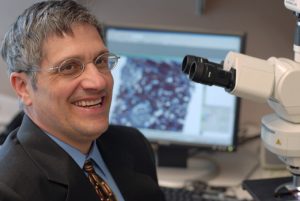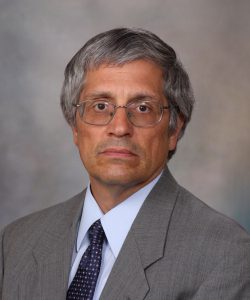Joseph Grande, M.D., Ph.D. – Q&A with a legendary Teacher of the Year awardee
Some physicians seem to accumulate armfuls of Teacher of the Year Awards. Joseph Grande, M.D., Ph.D. (PATH ’89, LABM ’91), is one of those.
Dr. Grande has a dozen Teacher of the Year Awards for Mayo Clinic School of Medicine as well as a Distinguished Educator Award, two Dean’s Recognition Awards, a Medical School Career Educator Award and a Distinguished Service Award from the National Board of Medical Examiners.
A consultant in the Division of Anatomic Pathology in the Department of Laboratory Medicine and Pathology at Mayo Clinic in Rochester, Dr. Grande joined the Mayo Clinic staff in 1989. He has joint appointments in the Division of Nephrology and Hypertension and the Division of Surgery Research. He is clinical director of the Electron Microscopy Laboratory and a professor of laboratory medicine and pathology. He directs a research program on chronic renal disease funded by the National Institutes of Health. He teaches pathology and cell biology to first-year medical students, and urology to second-year students.
What’s the secret to so many nominations from the students he teaches?
How do you know when you’ve done a good job teaching?
I’ve succeeded when I’m irrelevant. When students are able to do things more or less on their own, I feel that I’ve done a good job. When students reach this point, they can take things to the next level by themselves, initiate discussions on their own, look at things in new ways and communicate about it.
I don’t consider myself that good of a teacher. I consider myself more of a coach than a teacher. I try to take students from different backgrounds and do what’s necessary to make them successful individuals and members of the medical community.
What’s rewarding about teaching?
It’s a chance, in a small way, to make a difference to individuals. I enjoy building relationships with students, mentoring them, and helping them mature as people and as content experts.
What’s your teaching style?
I’m pathologically incapable of writing a lecture or a talk. My lectures are more stream of consciousness that focus more on how I think than what I know. Traditional teachers impart knowledge through transfer of information outlined in strict course objectives. Going back to the coach analogy, a coach is someone who is committed to making both individuals and groups successful. A coach is able to adapt their approach to bring out the best in people. This is what I strive to accomplish.
I try to create a comfortable, nurturing learning environment for the students. Our Admissions Committee has worked very hard to make sure that we have the best and brightest students. I really don’t waste a lot of time or effort in assessing students to determine whether or not they belong in medical school. Rather, I collaborate with students to define the best approaches to providing them what they need to be successful. It is imperative that students feel comfortable asking questions and challenging concepts without fear that they will be judged by faculty or other students. I have an open-door policy — a lot of the most effective learning occurs outside of a class setting.
I think humility is an important attribute. I understand that I don’t have all the answers, and I’m able to laugh at myself and my imperfections. I use humor — the ability to look at the failures and challenges that I faced as a student and beyond — as a mechanism to bridge the gap between student and educator — to build trust. As faculty, we’re not that different from students — we just have more experience. I never take myself too seriously.
How has your teaching changed over the years?
When I came on staff, we had some innovative ideas. We developed one of the first integrated basic science and clinical courses in the country. We team taught and looked at diseases from molecular, pathologic and clinical aspects. That concept of integrated basic science and clinical education has remained for 25 years and has now been incorporated by many medical schools throughout the world.
We also worked closely with the National Board of Medical Examiners to transform assessment during that same period — from a fact-based rite-of-passage exam to integrative assessment that requires reasoning skills. Students spend more time on clinical decision-making and critical thinking versus transfer of information.
How have students changed over the years?
Classes are more similar than different, although every class has a personality. They all aspire to be excellent as people, clinicians and educators. That thread is exactly the same today as it was 25 years ago. The main difference is if I tell jokes about Ronald Reagan, they say, “Who’s that?” The basic level of commitment that’s at the core of who they are hasn’t changed.
Who were your teaching role models?
My father was associate dean of first-year students at the University of Notre Dame, where I attended college. He directed a student-led mentoring program for first-year students. This model of student-led mentorship is the one that I currently use with my teaching assistants.
The dean of first-year students was Emil Hoffman, Ph.D. He also was a chemistry professor who taught tens of thousands of students and was a role model for me. He was an outstanding educator who cared deeply about his students.
At Mayo, I worked with Tom Viggiano (GI ’80), for 30 years. Anytime I have an issue with education, I go to him. He has impeccable integrity, and he exemplifies values-based leadership. He has spent countless hours mentoring students. They knew they could trust him and that he would put their interests first. He established an incredible program for undergraduate students considering medical school, and their parents. The program provided them with practical information and advice.
What do teacher of the year awards mean to you?
Although it’s a tremendous honor to be recognized, I do this for the students, not for the awards. I work very hard to earn the trust of students and to be a strong advocate for them. If I can play a small role in helping even a few students realize their incredible potential, not only will medical care be improved but the world will be a better place for the next generation to live. It is that opportunity to try and make a difference that motivates me.
The greatest strength of our medical school is our outstanding faculty. They’re all outstanding educators and very committed and willing to do what’s necessary to foster the education of students — despite heavy clinical schedules.
I became associate dean for Academic Affairs from 2006 to 2013. Most people, at that phase of their career, stop teaching. I decided to continue teaching despite my administrative responsibilities. The dean at that time wanted to enact major curriculum reform, and I wanted to demonstrate that I was no different from anyone else on the teaching faculty, subject to the same changes as everybody else. By all measures, the new curriculum has been successful; the new Mayo Clinic School of Medicine – Arizona campus will adopt most elements of this curriculum. That being said, I believe I have more potential to have an impact on students by teaching rather than serving in an administrative capacity.
Student comments:
“Dr. Grande makes the complex interplay of pathology and immunology seem like an easy, stepwise process that can be understood. And when it can’t all be understood, he laughs it off and focuses our attention on what is really important.”
“I remember his classes best even after years!”

